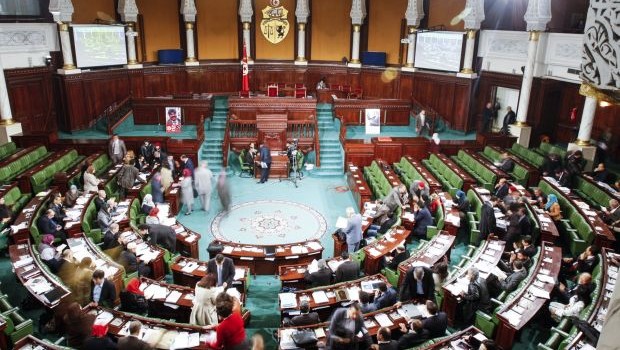The expression “every cloud has a silver lining” accurately describes some recent tensions within the Tunisian National Constituent Assembly—the body tasked with drafting the country’s new constitution—which began as a verbal spat between two of its members, Habib Ellouze and Mongi Rahoui. Ellouze, who is affiliated to the Islamist Ennahda Movement, stated on a Tunisian radio station that Rahoui, who belongs to the leftist Popular Front, was known for his animosity towards Islam. The situation escalated to the extent that within 48 hours a fatwa was issued against Rahoui calling for his assassination.
This tension is ideological and violent in appearance, form and mechanism. It has not passed unnoticed despite everything that has taken place in the country this month, from the resolution of the political crisis to the ongoing economic issues. Rather, it served as a firm and decisive pretext for the opposing blocs within the Constituent Assembly to insist on officially criminalizing the practice of takfirism—when one Muslim declares another to be an apostate—within the new Tunisian constitution.
If this particular incident of takfirism represents the “cloud,” its criminalization in the new constitution is the “silver lining.” For had it not been for the incident, the Constituent Assembly would not have approved the amendment to Article 6 of the constitution and the addition of the clause on “banning takfirism and incitement to violence.”
It is apparent that there is some kind of positive interaction between the political reality and the process of drafting the constitution. This is an important point that reflects how the constitution can benefit from this reality, as well as the errors, violence and slips of the tongue that permeate it. In other words, it is a constitution that is developing in tandem with real-life events, drawing upon the idea that what is happening today might happen tomorrow. Therefore, the process of drafting the constitution is not void of the pains of combining treatment and prevention together.
In addition to this interaction, I believe that the new Tunisia needs this kind of important and necessary adjustment. That is to say, the multiplicity of ideologies and backgrounds results in strong differences in approaches and concepts. So that the Tunisian elites avoid the destructive fires of takfirist wars, the constitution must act as the guarantor of the right to hold different opinions and to defend against anyone who embarks upon the practice of takfirism, or utters anything that could incite violence.
Of course there are some who see Ellouze’s comments to the media as falling within the framework of freedom of opinion and who think that they don’t necessarily equate to takfirism. In other words, in their view a person should be free to be anti-Islamic or anti-globalization or anti-Israel or against any other concept or ideology. This is logical, but this becomes takfirism when a fatwa is issued against this Constituent Assembly representative on the back of accusations that he is an enemy of Islam. In addition, it seems that context must be taken into account. This has its own provisions, laws and conditions. The context the country has been experiencing since the emergence of political Islam and Salafist jihadism—including a series of political assassinations—colors our interpretations of such statements. Based on the context and the events, any such statement automatically falls within the boundaries of takfirism and incitement to violence.
But other factors have also led to a state of alert with respect to civil society, rights and politics. More precisely, the representative who was accused of being an enemy to Islam belongs to a party of “national democrats” to which the “martyr of Tunisia,” Chokri Belaid, also belonged. Moreover, the modernist elites in Tunisia are very strict about such accusations and are completely aware of their dangers for Tunisian culture, society and security.
The other fundamental factor goes back to Ellouze himself. On the one hand, he is a senior member of the Ennahda Movement and its representative in the Tunisian National Constituent Assembly. He is also one of the hawks within Ennahda, having taken over its presidency in 1991 and presided over its Shura Council between 1980 and 1991. On the other hand, during the past two years, Ellouze has made a number of controversial statements: his somewhat positive attitude toward female circumcision caused uproar, as did his statement to a newspaper a few months ago that if he were a young man he would have gone to Syria take part in jihad, comments which came during an atmosphere of general political and social opposition to the phenomenon of young Tunisians going to Syria for the same reason. The status of the representative of the Ennahda Movement within the movement itself and his historical and political weight makes every word that he mutters a point of interest, importance and controversy.
All these aforementioned factors have given the dangerous statement that he issued on the radio significant magnitude both in terms of human rights and politics, and this has ultimately helped takfirism become explicitly criminalized in the draft constitution. I believe that provision is fundamental in order to eradicate this phenomenon from Tunisian society, prompting the political elite to carefully watch what they say, to recognize how loaded with symbolism and hidden meanings the Arabic language can be, and how takfirism leads to mistrust and suspicion.
